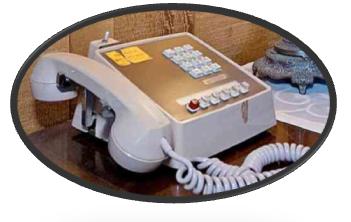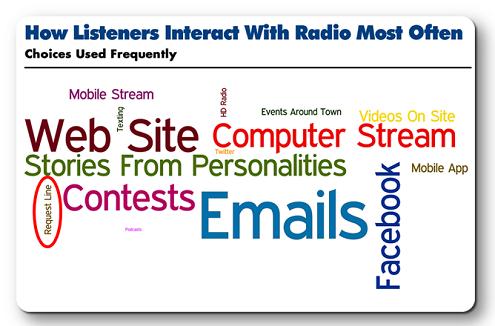While checking out my Twitter feed a couple weeks ago, someone offered up a great Seth Godin line that actually comes from a blog post that’s four years old. It hasn’t lost an ounce of importance during that time:
“The only reason to answer the phone when a customer calls is to make the customer happy.”
In this case, Seth was referencing a bad phone experience he had with a leading manufacturer of kitchen products. But the name of the company and the specifics of Seth’s complaints don’t really matter.
The larger issue is that if you have customers and a phone, your number one mission is to find a way to satisfy them. Otherwise, as Seth reminds us, “Do not answer the phone.”
 So let’s talk about radio’s historic telephonic connection to the audience: the request or studio line.
So let’s talk about radio’s historic telephonic connection to the audience: the request or studio line.
As marketing consultant Clay Christensen might ask, “What job is your request line hired to do?”
When your audience reaches for that phone, are they doing so to be caller 9? Is their goal to request a song? Or are they doing something to try to connect with a station they enjoy in a personal way – hoping to talk to the host or DJ on the air?
And how often does your station achieve the Godin Goal of making that customer happy? There’s a lot of talk about the death of newsprint, the camera, and even books. So let’s add the request line to that list. It is moving well down the listener’s pecking order of communication.
The request line is being used less and less to frequently contact the station. According to our Techsurvey8, a study of more than 57,000 core radio listeners, there are many other connection points the audience prefers over that studio phone:
So emails, your website or stream, contests, and social media are major conduits.
The request line? Look to the left side of the word cloud for the red oval.
In the big scheme of things, the request line has become a very small way that core fans connect with radio stations, an amazing statement about traditional communication and the way it’s changed in just the past few years.
But perhaps it also suggests that many listeners are wise to radio’s request line tricks – busying them out or just not answering them in the first place. And then there’s the rude treatment that many of them have incurred – just because they reached out to try and make a connection.
Acknowledgement is critical in the social media environment, and while Seth was speaking about phone service, he may as well have been pointing to Facebook pages, emails, and the other ways consumers choose to interface with brands.
Radio stations tackle everything else strategically – the music, giveaways, talk show topics, marketing campaigns, and personality shows.
The way in which we communicate with our best customers certainly deserves a place on that list.
- What To Do If Your Radio Station Goes Through A Midlife Crisis - April 25, 2025
- A 2020 Lesson?It Could All Be Gone In A Flash - April 24, 2025
- How AI Can Give Radio Personalities More…PERSONALITY - April 23, 2025





So – it seems that Facebook has been following Seth Godin’s advice and not picking up the phone:
“Here, for instance, is Mike Parker, the co-president of U.S. operations of Tribal DDB, talking about his frustration with Facebook: “For the longest time, we’ve been trying to call Facebook to do business with them and there’s nobody to pick up the call,” said Parker.”
https://news.cnet.com/8301-1023_3-57425696-93/frustrated-advertisers-to-facebook-take-our-money-please/
I guess Facebook figures that it can’t make the large advertisers happy, so they don’t answer the phone!
Steve, interesting story – thanks for sharing and commenting.